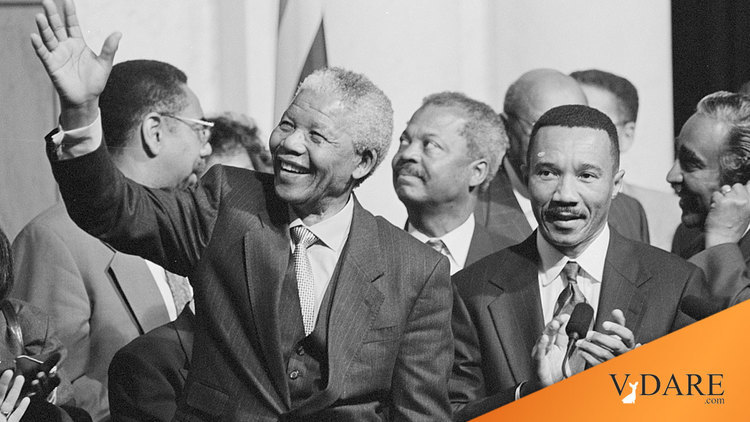
12/08/2013
In the New York Times, the nominally Leninist (but perhaps, deep down, more Mussolinist) Slovenian celebrity philosopher Slavoj Zizek laments:
Mandela’s Socialist Failure
By SLAVOJ ZIZEK
In the last two decades of his life, Nelson Mandela was celebrated as a model of how to liberate a country from the colonial yoke without succumbing to the temptation of dictatorial power and anti-capitalist posturing. In short, Mandela was not Mugabe, South Africa remained a multi-party democracy with free press and a vibrant economy well-integrated into the global market and immune to hasty Socialist experiments.
Keep in mind that Mugabe wasn’t Mugabe for the first two decades of his rule. He was handed a country with plenty of arable land for everybody (well, except for his archrival Joshua Nkomo’s tribe, but that was quickly forgotten). By 2000, the population had nearly doubled, however.
… Two key facts remain obliterated by this celebratory vision. In South Africa, the miserable life of the poor majority broadly remains the same as under apartheid, and the rise of political and civil rights is counterbalanced by the growing insecurity, violence, and crime. The main change is that the old white ruling class is joined by the new black elite. Secondly, people remember the old African National Congress which promised not only the end of apartheid, but also more social justice, even a kind of socialism. This much more radical ANC past is gradually obliterated from our memory. No wonder that anger is growing among poor, black South Africans.South Africa in this respect is just one version of the recurrent story of the contemporary left. A leader or party is elected with universal enthusiasm, promising a “new world” — but, then, sooner or later, they stumble upon the key dilemma: does one dare to touch the capitalist mechanisms, or does one decide to “play the game”? If one disturbs these mechanisms, one is very swiftly “punished” by market perturbations, economic chaos, and the rest. This is why it is all too simple to criticize Mandela for abandoning the socialist perspective after the end of apartheid: did he really have a choice? Was the move towards socialism a real option?
It is easy to ridicule Ayn Rand, but there is a grain of truth in the famous “hymn to money” from her novel Atlas Shrugged: “Until and unless you discover that money is the root of all good, you ask for your own destruction. When money ceases to become the means by which men deal with one another, then men become the tools of other men. Blood, whips and guns or dollars. Take your choice — there is no other.”
… We can safely surmise that, on account of [Mandela'] doubtless moral and political greatness, he was at the end of his life also a bitter, old man, well aware how his very political triumph and his elevation into a universal hero was the mask of a bitter defeat. His universal glory is also a sign that he really didn’t disturb the global order of power.
Judging from the TV commercials shown during golf tournaments, we live in the Age of Gladwell, the triumph of MultiCulti Capitalism.
This is a content archive of VDARE.com, which Letitia James forced off of the Internet using lawfare.